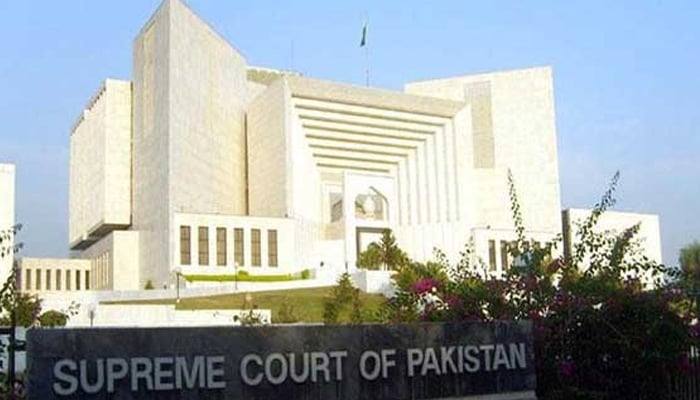Why NAB getting politicised, asks SC
"It seems as if the NAB is in no mood to proceed with this trial," Justice Gulzar Ahmed remarked.
ISLAMABAD: The Supreme Court of Pakistan on Tuesday criticised the National Accountability Bureau (NAB) for its "double standards" and questioned why the corruption watchdog had become "politicised".
A three-member bench of the apex court made these remarks after hearing a petition for bail filed by Sarang Latif, a section officer of the Sindh Ministry for Information. After turning down the petitioner's bail request, the bench censured the NAB.
"It seems as if the NAB is in no mood to proceed with this trial," Justice Gulzar Ahmed remarked, before asking: "Who is the prosecutor for this case?" An additional prosecutor told the judge that the lead prosecutor was from Karachi and he did not know his name. "(This) is a case concerning Rs5 billion," Justice Gulzar said. "It looks like the local prosecutor takes his money, shows up in court and leaves," he remarked.
Justice Qazi Faez Isa observed that "NAB's conduct is not the same in every case." "In some cases NAB goes the extra mile, but in others it does not seem to care. Why is NAB getting politicised?" he asked. Justice Gulzar also questioned why the NAB so often offers plea bargains.
"NAB does not seem to want to do anything; it has put everyone in misery," he said. "Millions of rupees of this nation are spent on NAB. Has it ever accomplished anything other than plea bargains? Let us know just one case where it has made a recovery," he observed.
Justice Isa suggested that a case should be registered against "the top officials of NAB" for their handling of the Mushtaq Ahmad Raisani case, from whose Quetta residence more than Rs730 million had been recovered in 2016.
"NAB wanted to strike a plea bargain even with a person from whose home billions were recovered," he recalled. Justice Gulzar further recalled that when the Supreme Court rejected bail requests in the Raisani case, NAB had approached subordinate courts and secured bail anyway.
-
 Paul McCartney Talks 'very Emotional' Footage Of Late Wife Linda In New Doc
Paul McCartney Talks 'very Emotional' Footage Of Late Wife Linda In New Doc -
 Princess Beatrice, Princess Eugenie's Response To Andrew's Arrest Revealed
Princess Beatrice, Princess Eugenie's Response To Andrew's Arrest Revealed -
 King Charles And Princess Anne Bestow Honours At Windsor Castle
King Charles And Princess Anne Bestow Honours At Windsor Castle -
 King Charles 'worried' As Buckingham Palace, Royal Family Facing 'biggest Crisis'
King Charles 'worried' As Buckingham Palace, Royal Family Facing 'biggest Crisis' -
 Milo Ventimiglia Recalls First Meeting With Arielle Kebbel On The Sets Of 'Gilmore Girls' Amid New Project
Milo Ventimiglia Recalls First Meeting With Arielle Kebbel On The Sets Of 'Gilmore Girls' Amid New Project -
 Eric Dane Infuriated After ALS Diagnosis As He Feared The Disease Would Take Him Away From His Girls
Eric Dane Infuriated After ALS Diagnosis As He Feared The Disease Would Take Him Away From His Girls -
 It's A Boy! Luke Combs, Wife Nicole Welcome Third Child
It's A Boy! Luke Combs, Wife Nicole Welcome Third Child -
 Leading Astrophysicist Shot Dead At Southern California Home
Leading Astrophysicist Shot Dead At Southern California Home -
 Johnny Depp's Kind Gesture Towards Late 'Grey's Anatomy' Actor Eric Dane Before Death Laid Bare
Johnny Depp's Kind Gesture Towards Late 'Grey's Anatomy' Actor Eric Dane Before Death Laid Bare -
 How Princess Eugenie, Beatrice React To Andrew Arrest?
How Princess Eugenie, Beatrice React To Andrew Arrest? -
 Kylie Jenner 'convinced' Gwyneth Paltrow Is 'crushing' On Timothee Chalamet: 'It's Disrespectful'
Kylie Jenner 'convinced' Gwyneth Paltrow Is 'crushing' On Timothee Chalamet: 'It's Disrespectful' -
 Gemma Chan Reflects On 'difficult Subject Matter' Portrayed In 'Josephine'
Gemma Chan Reflects On 'difficult Subject Matter' Portrayed In 'Josephine' -
 Blood Falls In Antarctica? What Causes The Mysterious Red Waterfall Hidden In Ice
Blood Falls In Antarctica? What Causes The Mysterious Red Waterfall Hidden In Ice -
 AI Power Play: Nvidia Moves To Invest $30 Billion In OpenAI
AI Power Play: Nvidia Moves To Invest $30 Billion In OpenAI -
 Will Savannah Guthrie Ever Return To 'Today' Show? Here's What Insiders Predict
Will Savannah Guthrie Ever Return To 'Today' Show? Here's What Insiders Predict -
 Andrew Mountbatten-Windsor In A Fix Over New Disturbing TMZ Photos
Andrew Mountbatten-Windsor In A Fix Over New Disturbing TMZ Photos




